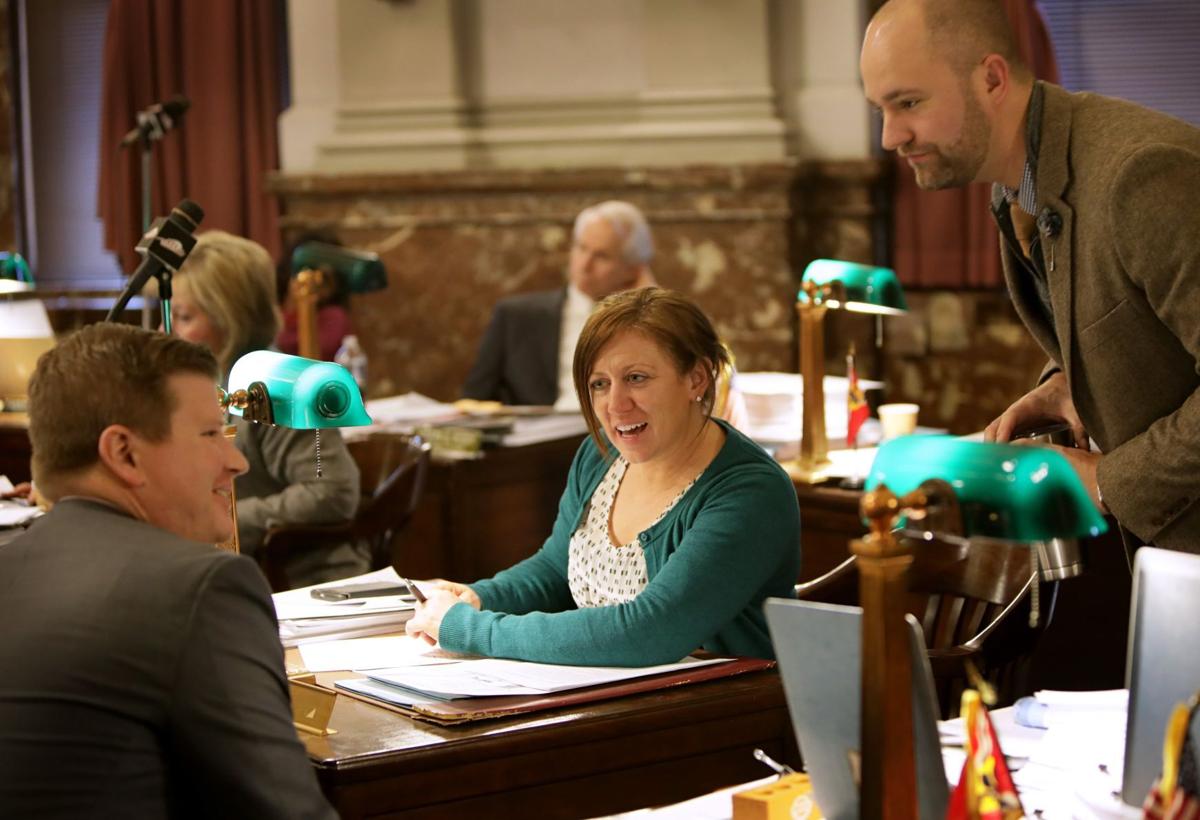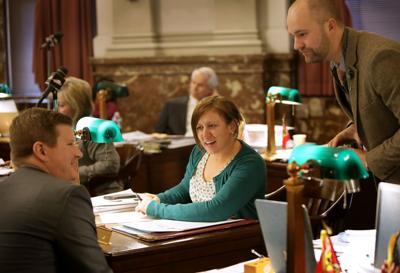ST. LOUIS ŌĆö After city voters last week elected four new aldermen aligned with the progressive faction of the party, some members of the Board of Aldermen say theyŌĆÖre interested in changing the rules that govern committee assignments. One alderman wants that debate held in public.
The boardŌĆÖs caucus meeting, which sets procedural rules for the legislative body after municipal elections every two years, is scheduled for 9 a.m. Tuesday morning at the LaborersŌĆÖ Local 42 union hall on Ewing Avenue.
On Monday, Alderman Christine Ingrassia, who represents parts of several south and central corridor neighborhoods, sent a letter to Aldermanic President Lewis Reed asking that the meeting be opened to the public. She argued it is not exempt from the stateŌĆÖs open records and meeting law because setting the rules relates to the functions of the Board of Alderman.
People are also reading…
ŌĆ£I believe the Sunshine Law in the state of Missouri clearly indicates that if we are undertaking business that has to do with the workings of the Board of Aldermen, the meeting needs to be public,ŌĆØ Ingrassia told the Post-Dispatch Monday. ŌĆ£This is not in any stretch of the imagination meant to be adversarial or accusatory. I just think sometimes these things that are steeped in history and tradition just kind of keep moving forward without anyone asking questions. I think we have a way to address it and admit that we should have been doing it differently and move on in order to serve our constituents better.ŌĆØ
Ingrassia said she began researching the rules in the wake of city voters passing Proposition D in November, which made the cityŌĆÖs March primary election nonpartisan and established a top-two runoff in the April municipal election. The board has for years been made up entirely of Democrats, but many ran without a party label this year under the new rules.
Reed spokeswoman Mary Goodman said Friday that the meeting isnŌĆÖt covered by the stateŌĆÖs open records law because itŌĆÖs a party function. Any aldermen or incoming aldermen declaring themselves to be Democrats can attend, she added.
ŌĆ£The president has called a caucus of the Democratic Party of the Board of Aldermen as he has always done,ŌĆØ Goodman said. ŌĆ£It is a Democratic Party caucus meeting as we always have had.ŌĆØ
But the Board of AldermenŌĆÖs attorney, Louis Galli, suggested that the caucus meeting is not a political party meeting, according to a copy of an email obtained by the Post-Dispatch.
The board would be meeting ŌĆ£as a public ŌĆśpublic governmental bodyŌĆÖ to discuss ŌĆśmatters which relate in any way to the performance of the public governmental bodyŌĆÖs functions or the conduct of its business,ŌĆÖ which is ŌĆśpublic business,ŌĆÖŌĆØ Galli wrote. ŌĆ£None of the exceptions for closed meetings apply.ŌĆØ
Goodman said the caucus is not a public meeting because it is intended for members of one political party to ŌĆ£organize and create their agenda without members of the other party disrupting.ŌĆØ
Any official votes on rule changes are done in public at the Board of Aldermen, Goodman added. ŌĆ£Nothing is official until the full Board of Aldermen meets and votes in public, which will occur on April 20,ŌĆØ she said in a text message.
Ingrassia declined to discuss specific rule proposals or whether they were being sought because of TuesdayŌĆÖs election results. The new members were backed by the progressive wing of the party, and a leader of the effort, Alderman Megan Green, says their wins give progressives 15 votes ŌĆö a majority ŌĆö on the 29-member board. That faction of the board has often clashed with Reed and his supporters.
Mayor-elect Tishaura Jones appears to have a friendly majority on the Board of Aldermen, where progressives hope to have a closer working relationship with the mayor.┬Ā
Some members of the board have already hinted that they may pursue rule changes on committee assignments. While seniority determines who serves as chair, current rules empower Reed to decide committee membership and which committees handle bills. Alderman Dan Guenther, a progressive who represents several south side neighborhoods, said last week he felt Reed has relegated some progressives to less impactful committees.
Ingrassia said some rules changes could update outdated language and may offer ŌĆ£an opportunity to determine whether or not there are ways to make the rules more equitable for everyone.ŌĆØ
ŌĆ£I think thereŌĆÖs definitely an appetite for some rule changes,ŌĆØ she said. ŌĆ£Quite honestly, I donŌĆÖt know how long itŌĆÖs been since theyŌĆÖve been comprehensively looked at and addressed.ŌĆØ
Alderman Joe Vaccaro, who represents parts of southwest ├█č┐┤½├Į and is considered aligned with ReedŌĆÖs faction, said the push appears designed to take away some of ReedŌĆÖs power. But Vaccaro isnŌĆÖt convinced the progressives have 15 votes and suspects Reed will be able to ŌĆ£keep it under control.ŌĆØ
ŌĆ£I donŌĆÖt really think thereŌĆÖs going to be a lot of change,ŌĆØ Vaccaro said. ŌĆ£If they really do want to change a lot of rules, then I think itŌĆÖll be game on.ŌĆØ
James Page, who unseated Alderman Tammika Hubbard in the 5th Ward covering downtown and the near north side last week, said Monday any rule change efforts werenŌĆÖt designed to take power away from ReedŌĆÖs office. Rather, he said, some aldermen are looking for ŌĆ£more efficient, more equitable ways of distributing roles and responsibilities.ŌĆØ
Ingrassia said Monday she hoped the caucus meeting would be pushed back to follow the stateŌĆÖs open meeting and records law.
ŌĆ£If we do it the right way, it hasnŌĆÖt been properly noticed,ŌĆØ she said. ŌĆ£So in my mind, we shouldnŌĆÖt be having a meeting tomorrow, we should be posting it at least 24 hours in advance.ŌĆØ
While he said he had no problem with opening the meeting, Vaccaro questioned whether other caucus meetings, such as the aldermanic African American caucus, would have to be public under IngrassiaŌĆÖs argument.
ŌĆ£I think sheŌĆÖs opening up a can of worms that she shouldnŌĆÖt,ŌĆØ he said.
Mark Schlinkmann of the Post-Dispatch contributed to this report.
Originally posted at 4:49 p.m. Monday
















